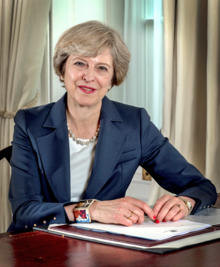UK prime minister
| Prime Minister of the United Kingdom | |
|---|---|

Royal Arms used by Her Majesty's Government
|
|
|
Government of the United Kingdom Office of the Prime Minister |
|
| Style | The Right Honourable |
| Member of | |
| Reports to | Parliament |
| Residence | |
| Seat | Westminster |
| Appointer |
Monarch of the United Kingdom |
| Term length | At Her Majesty's pleasure |
| Inaugural holder | Sir Robert Walpole
as First Lord of the Treasury and de facto first Prime Minister.
|
| Formation | 4 April 1721 |
| Salary |
£143,462(annual, including £74,962 MP's salary)
|
| Website | Official website |
The Prime Minister of the United Kingdom is the head of Her Majesty's Government in the United Kingdom. The prime minister (informal abbreviation: PM) and Cabinet (consisting of all the most senior ministers, most of whom are government department heads) are collectively accountable for their policies and actions to the Monarch, to Parliament, to their political party and ultimately to the . The office is one of the Great Offices of State. The current prime minister[update], Theresa May, leader of the Conservative Party, was appointed by the Queen on 13 July 2016.
The office is not established by any constitution or law but exists only by long-established convention, which stipulates that the monarch must appoint as prime minister the person most likely to command the confidence of the House of Commons; this individual is typically the leader of the political party or coalition of parties that holds the largest number of seats in that chamber. The position of Prime Minister was not created; it evolved slowly and erratically over three hundred years due to numerous acts of Parliament, political developments, and accidents of history. The office is therefore best understood from a historical perspective. The origins of the position are found in constitutional changes that occurred during the Revolutionary Settlement (1688–1720) and the resulting shift of political power from the Sovereign to Parliament. Although the Sovereign was not stripped of the ancient prerogative powers and legally remained the head of government, politically it gradually became necessary for him or her to govern through a Prime Minister who could command a majority in Parliament.
...
Wikipedia

